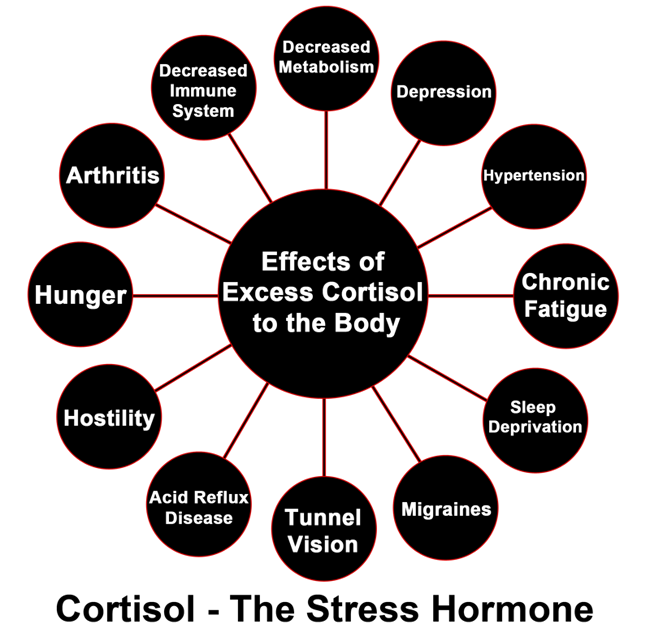The Impact of Stress on Metabolism and Weight

Stress is an inevitable part of life that affects everyone in some way. It is a natural response to challenges or demands, but when it becomes chronic, it can have detrimental effects on our health, including our metabolism and weight. Stress can be defined as the body's response to any demand or threat, whether real or perceived, that requires a physical or emotional response.
When we experience stress, our bodies release hormones, including cortisol, adrenaline, and noradrenaline, which trigger the "fight or flight" response. This response prepares our bodies for action, increasing heart rate, blood pressure, and respiration, while also increasing blood sugar levels and suppressing digestion.
While this response can be helpful in short-term situations, chronic stress can lead to long-term health problems, including obesity, diabetes, and heart disease.
Chronic stress can disrupt the normal regulation of hormones and neurotransmitters, leading to imbalances that affect appetite, metabolism, and sleep.
Therefore, understanding the impact of stress on metabolism and weight is crucial for anyone looking to maintain a healthy body weight and prevent chronic diseases associated with obesity. In this article, we'll explore the science behind stress and metabolism, the link between stress and weight gain, the impact of stress on weight loss efforts, and strategies for managing stress to promote better metabolic health.
The Science of Stress and Metabolism
The role of cortisol and other hormones in metabolism: One of the key hormones released in response to stress is cortisol, which plays a critical role in regulating metabolism. Cortisol triggers the release of glucose from the liver, providing energy for the body to deal with the stressful situation. However, when cortisol levels remain elevated over a prolonged period of time, it can lead to insulin resistance, a condition in which cells become less responsive to insulin, resulting in elevated blood sugar levels and an increased risk of developing diabetes.

How stress impacts the regulation of blood sugar and insulin: In addition to cortisol, stress also affects the regulation of blood sugar and insulin. When we experience stress, our bodies release glucose into the bloodstream to provide energy for the "fight or flight" response. However, chronic stress can disrupt the normal regulation of insulin, leading to insulin resistance and an increased risk of developing type 2 diabetes.
The impact of stress on appetite and food cravings: Stress can also have a significant impact on appetite and food cravings. When we are stressed, our bodies release hormones that increase our desire for high-calorie, high-fat foods. This can lead to overeating and weight gain, particularly if stress is chronic and leads to long-term changes in eating habits.
The relationship between stress and inflammation: Stress has also been linked to chronic inflammation, which can contribute to a range of health problems, including obesity and metabolic syndrome. Chronic stress can trigger the release of pro-inflammatory cytokines, which can lead to inflammation throughout the body. This can contribute to insulin resistance and other metabolic problems, as well as increased risk of chronic diseases such as heart disease, cancer, and autoimmune disorders.
The Link Between Stress and Weight Gain
Stress has been identified as a major contributor to weight gain, particularly in the abdominal area. Here are some of the key ways in which stress can impact weight:
How stress affects the storage and distribution of body fat: Research has shown that chronic stress can lead to an increase in the storage of body fat, particularly in the abdominal region. This is because stress triggers the release of cortisol, which can stimulate the accumulation of visceral fat - the type of fat that surrounds organs and is associated with an increased risk of metabolic disorders.

The impact of stress on sleep quality and quantity: Stress can also have a significant impact on sleep quality and quantity, which can in turn impact weight. Poor sleep has been linked to an increased risk of obesity, as it can disrupt hormones that regulate appetite and metabolism. Stressful situations can cause insomnia, and difficulty falling asleep, or staying asleep which can in turn lead to weight gain.
The link between stress and visceral fat: As mentioned earlier, stress is linked to an increase in visceral fat. This type of fat has been linked to an increased risk of metabolic disorders such as type 2 diabetes and cardiovascular disease.
How stress can disrupt healthy eating patterns and lead to weight gain: Stress can also disrupt healthy eating patterns, leading to weight gain. When we're stressed, we're more likely to reach for comfort foods that are high in sugar and fat, and less likely to make healthy choices. This can lead to overeating and weight gain over time.
The relationship between stress and chronic diseases associated with obesity: Finally, chronic stress has been linked to a range of chronic diseases associated with obesity, including cardiovascular disease, type 2 diabetes, and certain types of cancer. Managing stress is therefore crucial for maintaining overall health and reducing the risk of chronic diseases.
Stress and Weight Loss

To manage stress while trying to lose weight, it's important to develop healthy coping mechanisms. Here are some strategies that can help:
- Exercise: Regular exercise and physical activity have been shown to reduce stress levels and improve metabolic health. Exercise can help burn calories, build muscle, and improve insulin sensitivity. It can also help improve mood and reduce anxiety, which can be particularly helpful for people with high levels of stress.
- Mindfulness and relaxation techniques: Mindfulness and relaxation techniques, such as deep breathing, meditation, or yoga, can help reduce stress and improve overall well-being. Here is a link to Top 10 Ways to Reduce Stress and Improve Mental Health
- Support system: Having a support system, whether it's a friend, family member, or professional, can help provide encouragement and accountability during the weight loss journey.
- Self-care: Prioritizing self-care activities, such as getting enough sleep, taking a relaxing bath, or practicing a hobby, can help reduce stress and improve mood, which can in turn improve weight loss efforts.
- Sleep hygiene: Getting adequate sleep is essential for both stress management and metabolic health. Sleep deprivation has been linked to increased cortisol levels and insulin resistance, both of which can contribute to weight gain and other health problems. Aim for 7-9 hours of sleep per night and establish a regular sleep schedule to help regulate your body's circadian rhythms.
In conclusion, managing stress is crucial for maintaining optimal metabolic health and healthy weight management. By incorporating stress management techniques, exercise, adequate sleep, and mindfulness practices into our daily routine, we can support our physical and mental health and achieve our weight management goals.
If you have any questions or concerns about the impact of stress on metabolism and weight, or if you would like to learn more about stress management techniques, please don't hesitate to reach out to me, for guidance and support. As a qualified dietitian and nutritional psychiatrist, I can offer personalized advice and practical strategies to help you manage stress and improve your metabolic health. Contact me at Just Thrive by Dietitian Bert for more information.